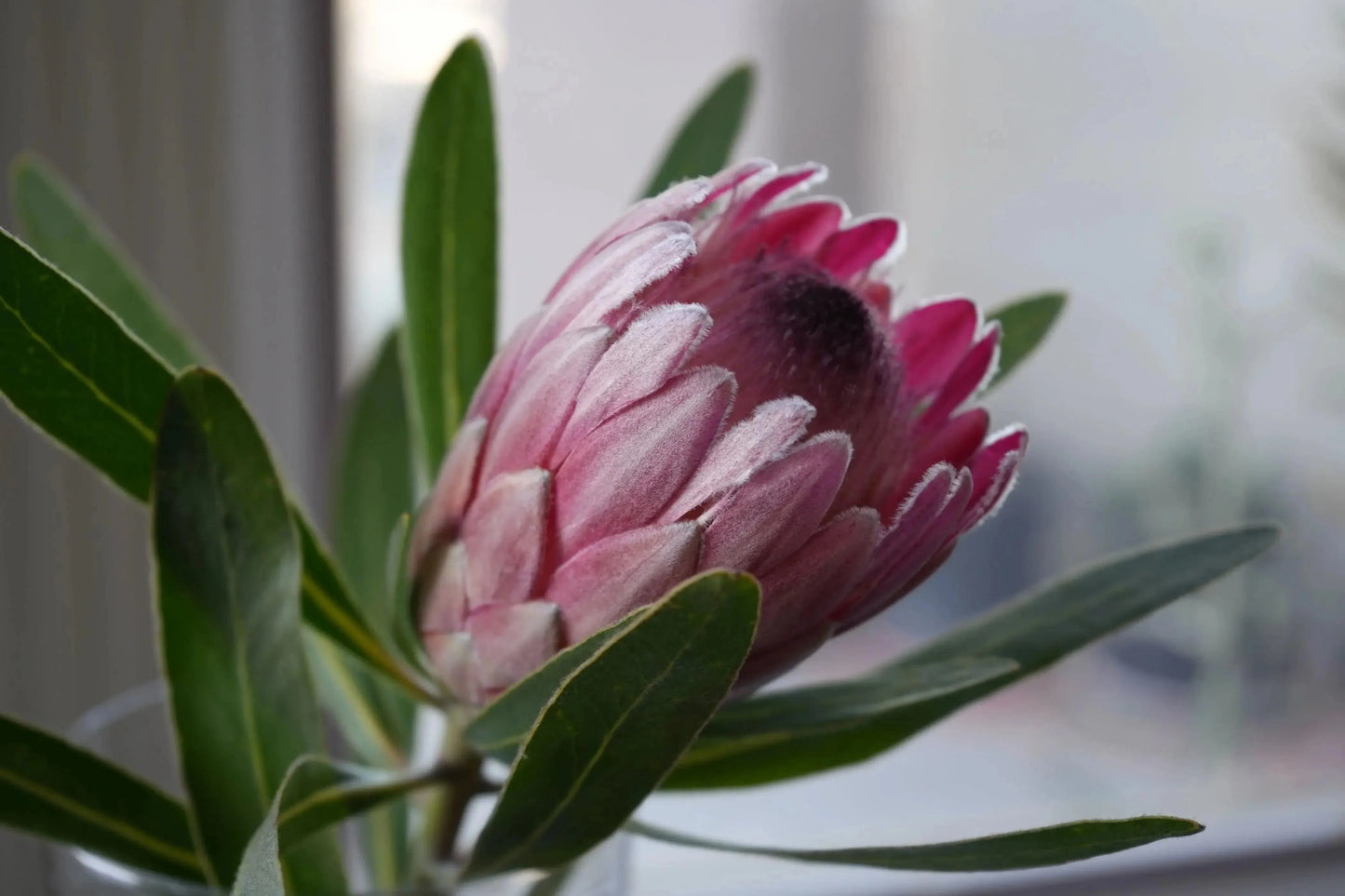Bonte Farm
Protea 'Pink Ice': The Hardiest Rose-Pink Blooms with Silvery "Frosted" Tips
Protea 'Pink Ice': The Hardiest Rose-Pink Blooms with Silvery "Frosted" Tips
Couldn't load pickup availability
Protea ‘Pink Ice’
Protea ‘Pink Ice’ is one of the most reliable and widely grown Protea cultivars, prized for its cold tolerance, vigorous growth, and stunning, florist-grade blooms. This hybrid selection of Protea neriifolia × Protea susannae produces large, conical flowers in rich shades of rose-pink to deep blush, accented by frosted, silvery tips along the bracts. The blooms sit upright at the ends of strong stems and contrast beautifully against the plant’s leathery blue‑green foliage. With long-lasting flowers and an extended bloom season, ‘Pink Ice’ provides exceptional color and structure in the garden and is highly valued in the cut-flower industry.
Adapted to warm, dry-summer climates, Protea ‘Pink Ice’ thrives in full sun and sharply drained, slightly acidic soils. It is one of the hardiest and easiest King Protea relatives to grow, making it a top choice for gardeners seeking a dependable Proteaceae shrub. Once established, it offers excellent drought tolerance, strong wind resistance, and minimal maintenance requirements. Its upright, rounded form and abundant flowering make ‘Pink Ice’ ideal as a specimen shrub, feature grouping, or standout element in Mediterranean, coastal, or low‑water gardens. Combining beauty, durability, and exceptional garden performance, Protea ‘Pink Ice’ remains a must-have cultivar for collectors and landscape designers alike.
Botanical Characteristics
| Characteristic | Detail |
|---|---|
| Scientific Name | Protea ‘Pink Ice’ |
| Common Name(s) | Pink Ice Protea |
| Growth Habit | Upright, rounded evergreen shrub |
| Foliage | Thick, leathery blue‑green leaves with smooth margins |
| Flowers / Bracts | Large conical blooms in rose-pink to blush with frosted silver bract tips |
| Flowering Season | Late winter through spring; intermittent flowering year-round in ideal climates |
| Special Features | Cold tolerant, drought tolerant, long-lasting blooms, excellent for cut flowers |
Mature Size and Form of Protea ‘Pink Ice’
Protea ‘Pink Ice’ typically reaches 4–7 ft tall (1.2–2.1 m) with a spread of 4–6 ft (1.2–1.8 m). It forms a sturdy, rounded shrub with dense, upright branches. Occasional light shaping may be done when young, but mature plants require minimal pruning beyond removing spent blooms.
USDA Hardiness Zone Recommendations
This cultivar performs well in USDA Zones 8b–11, making it one of the more cold‑tolerant protea hybrids. It thrives in Mediterranean, coastal, and dry inland climates with mild winters.
Cultivation and Care for Protea ‘Pink Ice’
| Aspect | Care Instructions |
|---|---|
| Sunlight | Full sun required for best flowering and compact growth |
| Soil | Acidic, sandy, or rocky soil with excellent drainage; avoid clay |
| Water | Low once established; prefers deep, infrequent irrigation |
| Fertilizer | Use only low‑phosphorus, native‑plant‑safe fertilizer |
| Pruning | Remove spent blooms; avoid hard pruning into old wood |
Landscape Use and Benefits
• Excellent as a specimen shrub or focal plant
• Highly valued in cut-flower production
• Perfect for Mediterranean, coastal, and drought‑tolerant landscapes
• Adds strong architectural form and long-lasting color
• Pairs beautifully with Leucospermums, Leucadendrons, Banksias, and succulents
Wildlife Attraction
Nectar-rich flowers attract bees, butterflies, and nectar-feeding birds. Dense evergreen foliage offers structural habitat for small wildlife.
Pest and Disease Resistance
Protea ‘Pink Ice’ is one of the most resilient proteas. Possible issues include:
• Root rot in poorly drained soils
• Sensitivity to phosphorus
• Occasional leaf browning from overwatering or humidity
Sharp drainage and low‑P nutrition are essential.
Propagation Methods
Best propagated from semi-hardwood cuttings to maintain uniform bloom color, size, and vigor.
Seed propagation is possible but produces variation.
Share






















